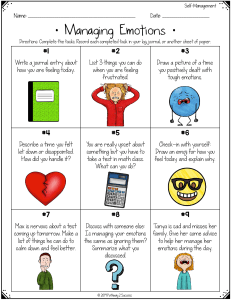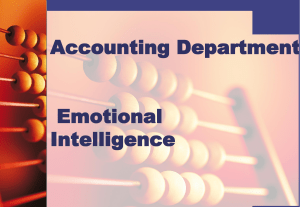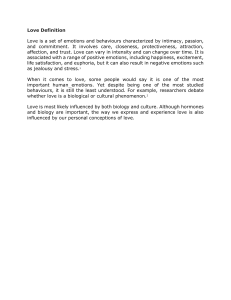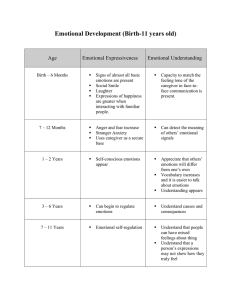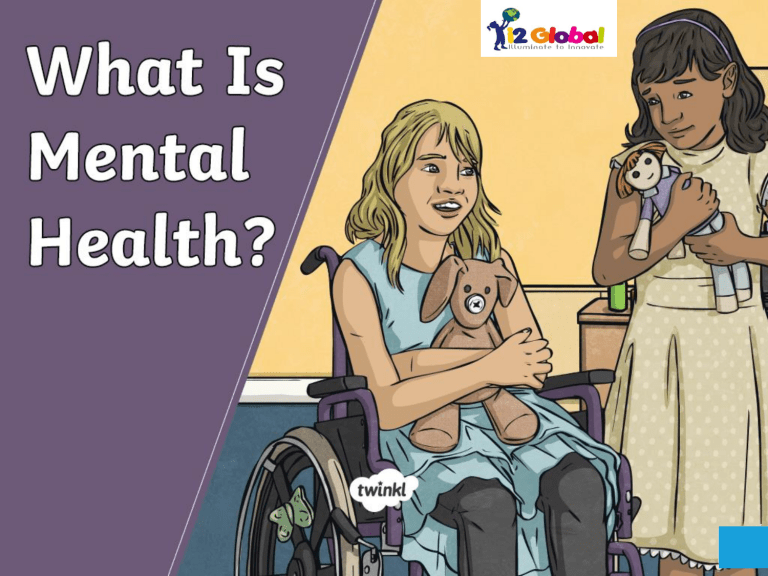
Feelings and Emotions Mental health is all about how we are feeling, the thoughts we are having and how this affects the choices we make and how we behave. It is also how able we are to cope with what is happening in our daily lives. Feelings and Emotions parents or worry fearstaff apprehension happiness school carers doctors excitement upset sadness grandparents contentment Childline on wider family loneliness calmness anxiety joy 0800 11 11 members anger frustration love teachers EveryPart feeling we mental experience is OK and it normal to and feel athe large of our health is how weisare feeling range of emotions. Some will be comfortable some may be emotions we are experiencing. Talk to theand person sitting uncomfortable. we experience uncomfortable emotions too often or next toIfyou. Can you name ten emotions or feelings for too long, or if our uncomfortable emotions affect our thoughts or together? behaviour in a way that hurts ourselves or others, it is important to speak to someone we trust to get help. Who might we speak to? Looking After Our Mental Health Just like we look after our physical health, there are lots of ways we can look after our mental health. Connecting with People Around us: Spending time with friends and family helps us to feel Being Mindful good. Social connections help us to share experiences and is Being mindful and really noticing what talk about howour we minds are feeling. going on around us helps to feel well. It helps us to cope with big feelings and focus on what is happening in the present moment, settling our thoughts. Helping Ourselves If we notice there are times when we experience emotions that we may find less comfortable, as well as talking to people we trust about them, we may find there are certain things that help us to feel better. These might include: playing a game; doing an activity we enjoy; spending time with people we care about; being mindful. Difficult Times Sometimes, we may find we struggle with our mental health. This is very normal and there are lots of ways we can get help. If we are at all worried or concerned about our mental health, it is important that we speak to an adult we trust to get help. teachers parents or carers school staff grandparents Childline on 0800 11 11 wider family doctors members Difficult Times There are many areas where people may find they need some support with their mental health. Some of the more common difficulties include: Anxiety Relationships with Food Depression Anger Depression Anxiety is a isanxious, feeling when our we mood may get is very when we We areto feel worried that or weafraid. lack We If we feel it is important tolow. speak people trustpurpose and Food is a feels very angry important part but of our lives. Sometimes, Everyone at times if this starts to affectpeople’s our thoughts and may all experience to engage with at other times emotions. but do it can be particularly feels low common from getstruggle help. There areanxiety also things we can toEveryone help ourselves. We can: relationship with overourselves time andorthis can result in eating and behaviour in afood waychanges that hurts others, it is important time around to time the time but ifofthese events low that times may last feelforstressful. a long time, This could happen include: often or lots not eating enough. can help causeourselves difficulties it can: is very to getorhelp. There are waysThis we can too.asWe interfere try with our daily life, wewrite maydown be suffering depression. is our It isfrom try It important to weget get the right balance of foods. very important to very having important to talk to people we trust about how we meditations; are feeling. worries if this helps; ansleep; argument speakenough to someone we trust if we are at all concerned about our try counting to ten There are some things we can do to help ourselves as well. We think about with someone love;Our GP can suggest and signpost us tocan: relationship withwefood. or breathing what makes us speak to to anan adult we try positive support that is available. eat a balanced diet deeply and speak adult calmly; practise get so we cantry angry speak to an our about affirmations; trust and stay hydrated; we or trust orGP our GP mindfulness; self-care; active; take steps to adult wethat trust support that is available. about support calm down as house. exercise - this can or our GP about ismoving available. try breathing soon as possible; release support keep a hormones diary of how we are feeling at that is eat a balanced diet exercise; taking exams exercises; starting new school orthat job; reduce times stress; available. different of the day or week; and staya hydrated; or tests; Supporting Others There may be times when we are worried about people we care about. If we are at all concerned about someone we care about, it is important to speak to might we an adult we trust toHow get support forknow them. if someone close to This could be: us is struggling with their mental health? Childline on 0800 11 11 parents or carers They may find it difficult to do day-to-day things. They may be irritable. doctors wider family They may find members it difficult to concentrate. They may seem withdrawn. school staff teachers They may not enjoy things they usually like. grandparents Positive Mental Health and Wellbeing There are many ways we can support our own mental health and wellbeing. Talk to the person next to you about how you could use these strategies to support your mental health. Positive Mental Health and Wellbeing Let’s be a class who know how to support positive mental health and wellbeing and talk to people if we need support for ourselves or others.

